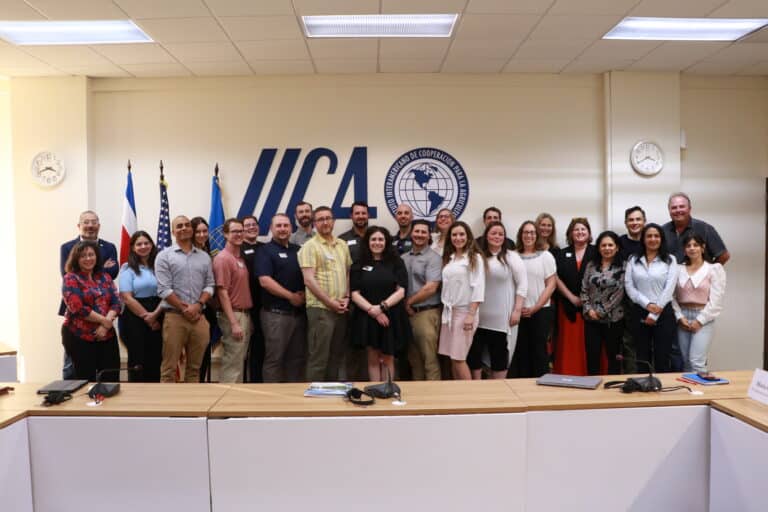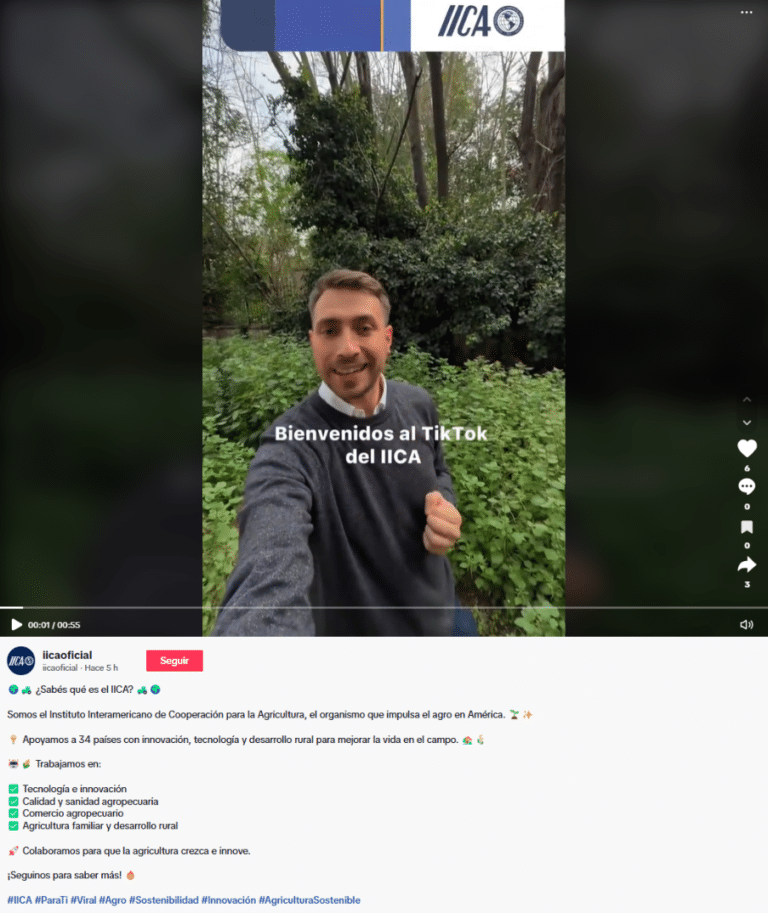The head of IFAD, an institution with 45 years of experience whose mandate is the eradication of rural poverty and the mobilization of funds to guarantee food security and ensure that rural dwellers generate sufficient income, also pointed out that his agency had carried out nearly 200 projects in 28 countries, with a particular focus on women, youth and indigenous peoples, investing more than USD 24 billion in partnership with governments and with the involvement of the private sector.

San José, April 24, 2024 (IICA). Guaranteeing access to resources, technology, information, and financing is crucial if rural communities in Latin America and the Caribbean (LAC) are to successfully tackle the challenges they currently face and continue to increase their contributions to food security, environmental conservation, poverty reduction, and job creation in rural areas.
Álvaro Lario, President of the International Fund for Agricultural Development (IFAD), emphasized this point during the First Meeting of Leaders of Rurality of the Americas organized by the Inter-American Institute for Cooperation on Agriculture (IICA), where he discussed with more than 40 leaders from 21 countries from every region of the continent the challenges they face in boosting rural development.
“We focus exclusively on investing in agriculture, in food systems, so that rural communities around the world have access to financial services, inputs, information, technology, infrastructure, and markets, and are able to develop resilience and strengthen their own development in the countryside,” Lario explained.
The head of IFAD, an institution with 45 years of experience whose mandate is the eradication of rural poverty and the mobilization of funds to guarantee food security and ensure that rural dwellers generate sufficient income, also pointed out that his agency had carried out nearly 200 projects in 28 countries, with a particular focus on women, youth and indigenous peoples, investing more than USD 24 billion in partnership with governments and with the involvement of the private sector.
“We invest in this rural population in order to train them and be able to increase their food security, improve the nutrition of their families, and augment their income. After all, if we want people to live in rural areas and have decent lives, we need them to generate their own income. Women, youth and indigenous peoples play a very important role in terms of identity, the preservation of traditional knowledge, the rights to land, territory, resources, protection and traditional food systems,” he remarked.
“What this allows them to do is take charge of their own development with the implementation of projects that support the efforts of small farmers, small rural businesses that create jobs and improve production, productivity, enabling them to feed their families but also to sell their surpluses in markets, which is often one of the problems, access to those markets,” Lario added.
At the meeting organized by IICA, the President of IFAD detailed his agency’s actions in various Latin American countries, such as Brazil, Bolivia, Colombia, Honduras and Mexico, and said that “with IICA we want to have a relationship in which we can also support many countries with advisory and technical assistance for governments. Currently, our portfolio has an impact on more than half a million rural households, which translates into millions of people. This year we will approve projects worth USD 900 million.”
Lario also explained that IFAD focuses its actions on issues such as water and climate adaptation, key to the development of rural territories and to the prevention of forced migrations that simply trigger another series of social challenges.
“We want to build prosperous rural communities, which then create good jobs, nutritious food, and this dialogue between IICA and the Leaders of Rurality of the Americas is a step in the right direction, to listen, share ideas, learn from each other, see what lessons we can learn, and then build networks,” the head of IFAD concluded.
At the meeting with the Leaders of Rurality, Lario presented three examples of projects his agency has implemented: one in Bolivia, on climate resilience in the traditional breeding of llamas and alpacas; another in the south of the State of Oaxaca, in Mexico, training young indigenous producers in bee farming and tourism promotion; and a third, in Colombia, where IFAD is working with 2000 young people in 70 municipalities and helping to develop a national policy for rural youth.
Some leaders who received support from IFAD also shared part of their experience and how the financial assistance helped them increase the impact of their projects and support rural development in their rural communities.
“We were a project initially supported by FIDA when no one knew about it, and it ‘catapulted’ us. IFAD donated a pineapple packing plant to us that helped us take our produce to the United Arab Emirates,” said Joelin Santos, President of the Monte Plata Pineapple Producers Association in the Dominican Republic, which today has more than 400 members.
“When we conceived the project, we didn’t think we’d need it to be able to sell our pineapple. FIDA, our sponsor at the time, realized that we did and, because of that, everyone, the government and state agencies, noticed us,” he added.
Francisca Neri is the Secretary for Family Farming of the Municipality of Betânia, in the State of Piauí, in northeast Brazil, and a member of the board of COOVITA, a local cooperative. She described the experience of Viva el Semiárido, a state government project implemented by IICA with resources from the International Fund for Agricultural Development (IFAD) and the Government of Piauí.
“I was reborn with this project, a 17-year-old girl who had no electricity, who didn’t know what she was going to do with her life, joined an association of sheep and goat breeders thanks to an IFAD project carried out in the semi-arid region, which was a great success in my state, and changed the lives of many women and young people. There were positive benefits for 450 families,” Neri remarked.
“We were able to transform our lives, raise our livestock with dignity, give our associations dignity. We have been able to increase production, improve the quality of what we produce, and market our products. All this thanks to IFAD projects that have reached the hinterland of Brazil, which many people don’t think is fertile, but it’s one of the most fertile areas I know of in the world,” she concluded.
More information:
Institutional Communication Division.
comunicacion.institucional@iica.int











